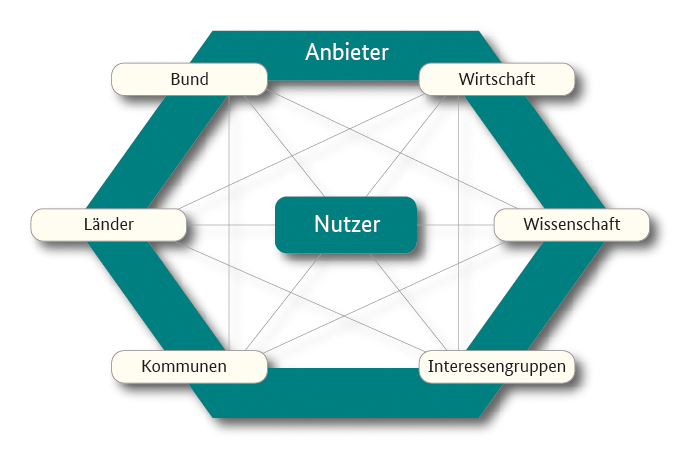
National Spatial Data Strategy
NGIS
National Spatial Data Strategy
Geoinformation is the basis for a wide range of planning and action decisions. Its full value unfolds in particular when combined with different data from a wide variety of sources. Only by looking at the whole connections, interactions and the resulting consequences can be recognised.
Geoinformation should
- be able to be used effectively for all spatially related decision-making processes,
- be collected entirely and used in a value-added manner,
- help to support national and local interests and fulfil obligations
As a joint task, German geoinformation policy must be designed in a sustainable and forward-looking manner so that the entire complexity of the topic is adequately taken into account. This requires a coordinated strategic approach.
For this reason, the Steering Committee Spatial Data Infrastructure Germany (LG GDI-DE) developed the National Spatial Data Strategy (NGIS) as early as 2015, with the involvement of industry and science in a broad-based public online participation process and with strong political resonance. The NGIS and the goals defined in it represent the desired status, i.e. a vision until the year 2025, in the field of geoinformation in Germany.
The NGIS is aimed at all public administration, business and scientific bodies as well as interest groups that collect, maintain, provide or use geodata. These are called upon to contribute to the implementation of the goals of NGIS with their own measures in dialogue across all professional and organisational boundaries.

The NGIS is to be understood as a common understanding of the roles of all actors involved and defines the common principles and objectives of the federal, state and local governments with regard to the national geoinformation system as established by the Steering Committee SDI Germany. It represents the foundation of the Spatial Data Infrastructure Germany and forms the strategic-abstract bracket for this area. In terms of content, the strategy is dedicated to the special concerns of the nationwide geoinformation sector, but also radiates into other disciplines with geo-related issues. The NGIS can act as a reliable reference for projects in the geo-context or as a basis for the use of spatial geodata to activate useful value-added potential.
SDI Germany as key to implementation
The Spatial Data Infrastructure Germany (SDI Germany) with its interdisciplinary cross-sectional function plays a key role in the implementation of the NGIS goals, because it networks, publishes and makes available the available geoinformation. Only by making geoinformation as widely available as possible, it is possible to raise awareness of the importance and added value of geoinformation and promote its targeted use. This applies in particular to those bodies which have not yet made targeted use of geoinformation.
The high relevance of NGIS and SDI Germany for digitalisation has also been recognised by the IT Planning Council and in its reports to the Conference of the Head of the Federal Chancellery (ChefBK) with the heads of the State and Senate Chancelleries (CdS), the IT Planning Council emphasised the fundamental importance of NGIS and SDI Germany for federal IT and e-government infrastructures. The NGIS is an important addition to the National E-Government Strategy (NEGS) and thus a building block for Germany's digital policy. It promotes cooperation between the federal, state and local governments in information technology and, in particular, in the exchange of data and in the application of available geoinformation as a valuable public good.
